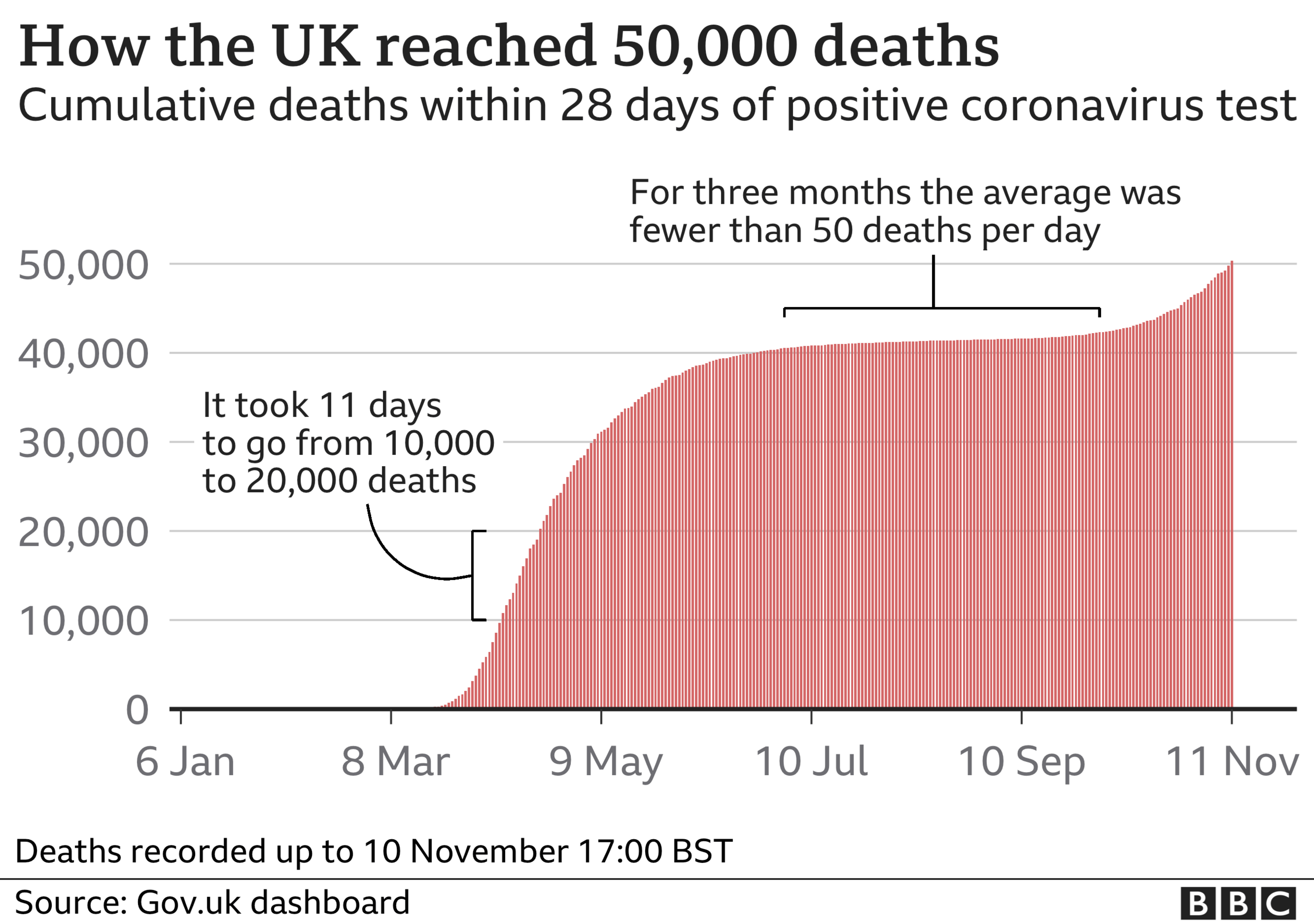Covid: UK first country in Europe to pass 50,000 deaths
- Published

The UK has become the first country in Europe to pass 50,000 coronavirus deaths, according to the latest government figures.
A total of 50,365 people have died within 28 days of a positive Covid test, up 595 in the past 24 hours.
The UK is the fifth country to pass 50,000 deaths, coming after the US, Brazil, India and Mexico.
Prime Minister Boris Johnson said the figures showed, despite hopes for a vaccine, "we are not out of the woods".
He said: "Every death is a tragedy," but added: "I do think we have got now to a different phase in the way that we treat it."
A further 22,950 cases of coronavirus were recorded on Wednesday, government figures show, external.
There have been some 1.2 million confirmed cases in the UK since the epidemic began, and more than 185,000 people have been admitted to hospital with the virus.


The UK's Covid death toll has reached a grim and tragic milestone - and illustrates what a devastating impact the pandemic has had on the country.
But one figure alone cannot tell the full story. The burden has not been felt equally.
The single biggest factor has been age - with more than nine in 10 deaths in the over 65s.
Poorer areas and ethnic minorities have also been disproportionately affected.
Deaths from other causes have also risen as people have gone without treatment.
The UK has on most measures seen one of the highest death rates in the world.
Blame, understandably, has been laid at the government's door. It has been criticised in particular for being too slow to lockdown and for its record on testing and tracing.
But the UK is not alone in struggling. Similar debates have been had in Italy, Spain and France.
And the sad reality is this figure will keep climbing in the months to come.
But there is now at last some real hope that, with a vaccine looking likely, the toll will be much, much less next year.

The government's death figures only include people who died within 28 days of testing positive for coronavirus - but two other ways of measuring deaths give higher overall figures.
The first includes all deaths where coronavirus was mentioned on the death certificate, even if the person had not been tested for the virus. The most recent figures suggest there had been more than 60,000 deaths by 23 October, by this measure.
The second is a measure of "excess deaths" - the number of deaths over and above the usual number at this time of year.
Deaths normally do rise at this time of the year, but the latest data from the Office for National Statistics and its counterparts in Scotland and Northern Ireland show the second wave of the virus has pushed the death rate above the average seen over the past five years.


Labour leader Sir Keir Starmer said the latest death figures were a "grim milestone" and criticised the government for being "slow" in its response to the pandemic during the first wave.
He said the government owed it to the families of those who have lost their lives to the virus "to get on top" of its response to the second wave.
The British Medical Association (BMA) said lessons had to be learned.
Dr Chaand Nagpaul, BMA council chair, said: "This is a point that should never have been reached."
He added: "Today's figure is a terrible indictment of poor preparation, poor organisation by the government, insufficient infection control measures, coupled with late and often confusing messaging for the public."
The government had to "ensure that nothing on this scale ever happens again", he added, with a public inquiry to "go over every step with a fine-tooth comb".
Anti-vax views 'nonsense'
It comes as officials said no decision has yet been made on how people under the age of 50 should be offered a Covid vaccine.
The current priority list of people who would get a vaccine in "phase one" starts with those living and working in care homes, then - in stages - everyone over 60 years old.
But the list is subject to change, with close attention being paid to how the vaccines work in older age groups, who often have a weak response to immunisation.
Attention has turned to how a vaccine will be rolled out after Pfizer and BioNTech revealed their vaccine protects more than 90% of people from developing Covid symptoms.
The prime minister urged everybody to get a coronavirus vaccine once one becomes available, adding that the arguments of anti-vaccination activists were "total nonsense".
Boris Johnson: “Anti-vax is total nonsense is total nonsense, you should definitely get a vaccine."
Mr Johnson would be happy to receive a coronavirus vaccine, Number 10 has said.
On a visit to a Tesco distribution centre in south-east London on Wednesday, Mr Johnson said the prospect of a vaccine and the ramping up of testing were "two big boxing gloves" to "pummel" the virus with, but said: "Neither of them is capable of delivering a knock-out blow on its own.
"That's why this country needs to continue to work hard to keep discipline and to observe the measures we've put in."
Restrictions have been tightened across the UK in recent weeks. In England, a new four-week lockdown started last Thursday - replacing the three-tier system until 2 December.
Mr Johnson said England must "get through this current period of tough autumn measures" to "hopefully" curb the spread of the virus enough to allow Christmas to be "as normal as possible for as many people as possible".

Meanwhile, pubs reopened and travel restrictions were lifted in Wales on Monday, as it ended a two-week "firebreak" lockdown.
Additional restrictions in Northern Ireland are due to end on Friday after a proposal from the Northern Ireland Assembly's health minister to extend restrictions was blocked.
In Scotland, there is now a five-tier system of virus alert levels with different measures in place in different parts of the country. The tiers are numbered from zero to four, with level four requiring the introduction of lockdown restrictions for that area.

TESTING: What tests are available?
GLOBAL TRACKER: Where are the virus hotspots?
YOUR QUESTIONS: We answer your queries


5 TIPS FROM NIGELLA LAWSON: How to cook your best ever food in lockdown
MASK WASHING MYTHBUSTER: The dos and don'ts of washing face coverings


If you would like to send us a tribute to a friend or family member who died after contracting coronavirus, please use the form below.
Please remember to include a photo of your loved one and their name. Upload your pictures here. Don't forget to include your contact details, so we can get in touch with you.
We would like to respond to everyone individually and include every tribute in our coverage, but unfortunately that may not be possible. Please be assured your message will be read and treated with the utmost respect.
Please note the contact details you provide will never be published. Please ensure you have read our terms & conditions and privacy policy.
If you are reading this page and can't see the form you will need to visit the mobile version of the BBC website to submit your tribute.

- Published1 July 2022

- Published11 November 2020

